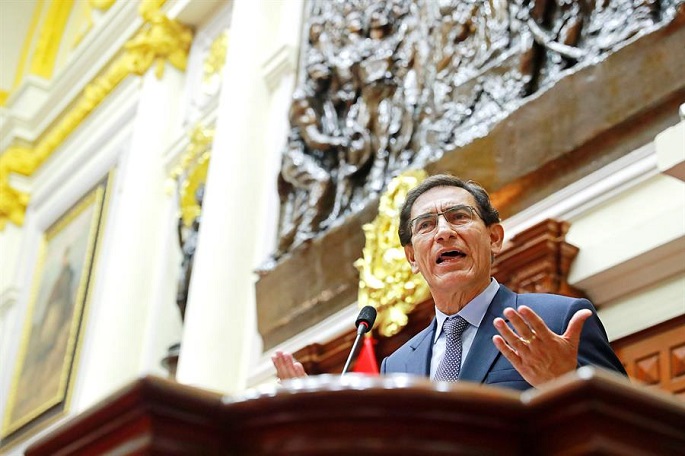Peruvian president to leave office following impeachment vote
Published : 10 Nov 2020, 11:24
Peruvian president Martín Vizcarra on Monday accepted the decision of Congress that voted for his ouster as head of state for "moral incapacity" during his impeachment trial and announced that he will immediately leave Government Palace, reported EFE-EPA.
Earlier, with 105 votes in favor, the so-called "vacancy motion" brought against the president due to accusations that he committed acts of corruption when he was governor of the southern province of Moquegua (2011-2014), exceeded the number required by the constitution (87 out of 130 members) and automatically paved the way to strip Vizcarra of the presidency.
The parliamentary resolution declared the "permanent moral incapacity of the president" and therefore "the vacancy of the presidency of the Republic."
“Today I am leaving the Government Palace. Today I am going home, despite the fact that there are innumerable recommendations for us to act through legal actions to prevent this decision," Vizcarra, 57, said in a statement given in the courtyard of the palace surrounded by his ministers.
Vizcarra, who looked relaxed and informal, although visibly moved during the final part of his statement, assured that in line with his "democratic convictions" he accepted the decision of Congress and did not want his service to the people to be seen as only a way to exercise power.
"All my life I have acted with transparency and putting all my effort, my ability and my heart at the service of the people, and you all know it," he remarked before thanking "the whole team" that has accompanied him during his tenure, which began in March 2018, as well as the Peruvian people for their support.
"I leave the Government Palace as I entered two years and eight months ago, with my head held high, and ready to face the investigations (...and) the falsity of the accusations within the framework of due process," he said.
The presidential responsibilities will now fall to the head of Congress, Manuel Merino, from the Popular Action party, until the general election scheduled for Apr. 11 next year. He is expected to be sworn in as interim president on Tuesday.
Vizcarra had appeared early on Monday morning to present his defense. He categorically denied having received any type of bribe and slammed the impeachment process against him, saying it had been opened under accusations not corroborated by the justice system.
“There is no proof of flagrancy of a crime, nor will there be because I have not committed a crime, I have not collected a bribe (...) They are false facts, not corroborated, an investigation process is just beginning, they are hypotheses,” said Vizcarra.
However, most of the benches of Congress appeared hostile to the president from the beginning, accusing him of being a “liar,” “immoral,” “corrupt” and of being responsible for the country’s political instability.
Also constant were the declarations of the deputies who indicated that they would vote “for the country” and without considering “political calculations” or “media pressure” – all references to requests for calm and responsibility that the media, business associations and civil society groups asked of Congress, citing a risk that the fall of the leader could pose to the stability of the country.
The decision of Congress generated surprise, confusion and indignation, with cacerolazos and citizen protests, as well as condemnation from politicians, analysts and even representatives of the Catholic Church, such as the Archbishop of Lima, Carlos Castillo, who asked the parliament to rectify its decision.


